The best way to provoke China is to play the Taiwan card. It works every time. And the trigger is always the United States. In January, the U.S. warned China – “We urge Beijing to cease its military, diplomatic, and economic pressure against Taiwan. We will continue to assist Taiwan in maintaining a sufficient self-defence capability. Our commitment to Taiwan is rock-solid.”
That statement alone was enough to draw the ire of Beijing. Immediately, a total of 15 Chinese military aircraft, including fighter jets and anti-submarine aircraft, were scrambled into Taiwan’s Air Defense Identification Zone (ADIZ). Subsequently, more similar sorties have been launched by the People’s Liberation Army (PLA) to warn and intimidate Taiwan.
To show its displeasure at the Biden administration’s pro-Taiwan policy, China has even conducted a mock attack on the U.S. Navy’s Nimitz class aircraft carrier USS Theodore Roosevelt, as the U.S. carrier strike group sailed into the South China Sea. Obviously, Beijing has no intention to stop intimidating Taiwan as suggested by the newly crowned U.S. president.

But what really caught Taiwan by surprise was a sudden boycott of its juicy pineapples. The Taiwanese fruit has become the latest victim of deteriorating Taiwan-China relations after China’s General Administration of Customs announced last Friday that the pineapples will be suspended effective from March 1. The Chinese customs office claimed “harmful pests” had been detected in recent shipments.
If the reason used by Beijing to ban Taipei’s fruit sounds familiar, that’s because China had used the same excuse against Australian export products in retaliation against PM Scott Morrison. Last year, timber from Queensland was banned, as it allegedly contained bark beetle called “Ips grandicollis”, dealing a blow to the Aussie timber and wood products – worth a staggering A$1.9 billion.
But in the case of Taiwanese pineapples, fortunately, the trade value was not really huge. Taiwan produces nearly 420,000 tonnes of pineapples every year, and pineapples reportedly make up about 40% of the sub-tropical island’s total fruit exports, of which 97% goes to China. It had exported 6,200 batches to China since last year, with only 13 batches, totalling 141 tonnes, failing tests.
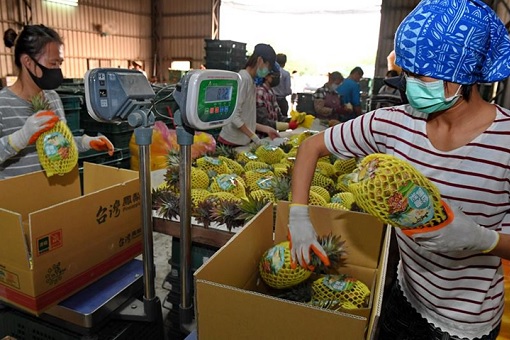
Despite the failure rate of 0.21%, the Chinese authorities insisted action has to be taken after “mealy bugs” were found. However, Taiwan’s government rejected the claim, accusing Beijing of making an “unacceptable” and “unfair” unilateral decision. Taiwan’s minister of economic affairs Wang Mei-Hua has even accused China’s sudden ban of failing to meet the standards of international trade rules.
The move was seen by Taiwan as a direct attack on the ruling Democratic Progressive Party (DPP) government, which is frequently critical of Beijing. China, of course, has denied accusations that the ban on imported pineapples was about politics. The Chinese government said the pests would have posed a serious threat to China’s agriculture and ecological security if not intercepted.
Frustrated, Taiwan’s president, Tsai Ing-wen, took to Twitter, urging the public to support and consume the local fruit while at the same time wrote that like the Australian wine – “China’s unfair trade practices” were targeting Taiwan’s pineapples. She also told people to enjoy Taiwan’s pineapples “whether in a smoothie, a cake, or freshly cut on a plate”.
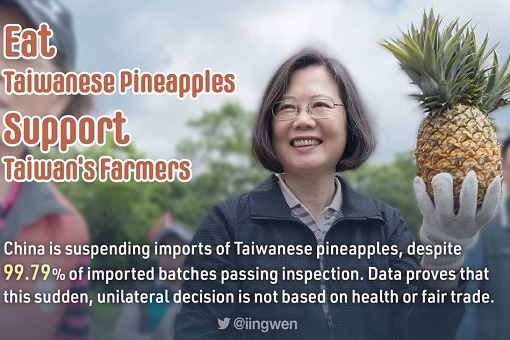
Taiwan’s Council of Agriculture announced that it would spend NT$1 billion (US$35.33 million) in assistance to Taiwan’s pineapple farmers. The trade attack was clearly designed to punish Taiwan’s farmers, especially in Pingtung County, which accounts for 30% of the country’s production. In the southern Taiwan, farmers are preparing to harvest, which will run from March to June.
Meanwhile, a “Freedom Pineapple” campaign launched by Foreign Minister Joseph Wu has attracted massive interest from Taiwanese businesses and people. In just 4 days, the entire year’s worth of pineapples had been snapped up. The campaign saw how Taiwanese farmers received pre-orders for 41,687 tons of pineapples from companies, e-commerce platforms, and consumers.
In response to the last minute “ambush”, Tsai government has pledged to expand the export market by increasing overseas sales incentives and “strengthening marketing activities” in the United States, Japan, Singapore and other new international markets like Malaysia, and Australia. As expected, the U.S. and Canada have made full use of the opportunity to support Taiwan.
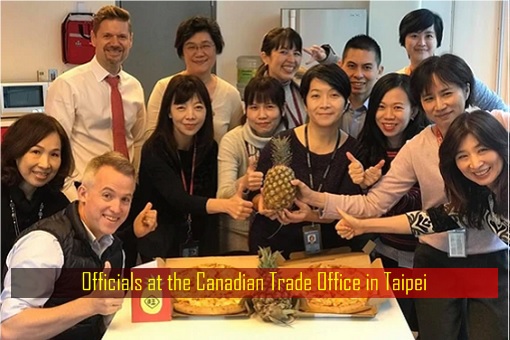
The de facto Canadian embassy in Taiwan has used the #FreedomPineapple hashtag to show its chief, Jordan Reeves, posing with colleagues around a pineapple pizza. Separately, the American Institute in Taiwan used the hashtag #pineapplesolidarity and shared pictures of the tropical fruit in offices and bookshelves. The Facebook message says – “Have you bought your pineapples? We have!”
Beijing claims full sovereignty over Taiwan and has threatened military retaliation if the island declares “independence”. The political status of Taiwan is a result of the Chinese Civil War between the Kuomintang (KMT)-led government of the Republic of China (ROC) and the forces of the Communist Party of China lasting intermittently between 1927 and 1949.
Eventually, the Communists won and gained control of mainland China and established the People’s Republic of China (PRC) in 1949, forcing the leadership of the Republic of China to retreat to the island of Taiwan. The split of China into two self-governing entities saw both the ROC in Taiwan and the PRC in mainland China claims to be the legitimate government of all China.
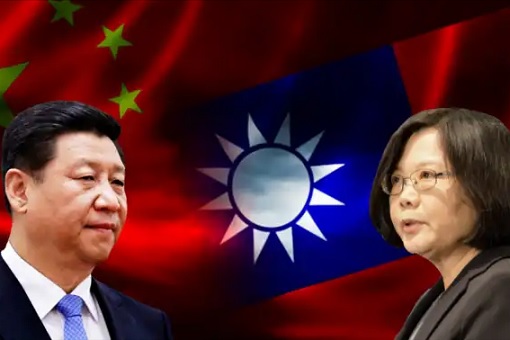
However, since the ROC lost its United Nations seat as “China” in 1971, most sovereign states have switched their diplomatic recognition to the PRC as the representative of all China. Essentially, it means Taiwan is not recognised as an independent country by the United Nations. Under “One China” policy, the US recognises and has formal ties with China rather than the island of Taiwan.
But whenever the U.S. wants to extract concessions from China, they would pour fuel into the fire in regard to recognition of Taiwan. For example, a bill was introduced last week in the House of Representative calling for the U.S. to resume diplomatic ties with Taiwan. Trump, in his last days in office, removed decades-old restrictions on interactions with Taiwan officials just days before Biden takes office.
Even though the campaign to eat more pineapple has won the support of the Taiwanese people this round, it does not solve the root problem in the island’s pineapple market. There is still a huge supply volume next season and those pineapples will face the same difficulties. Unless friendly countries like Japan and Australia can absorb 42,000 tons annually, the farmers are still in trouble.
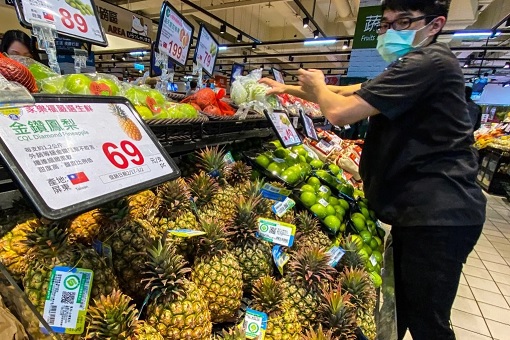
Other Articles That May Interest You …
- China Will Import Coal From Any Country, Except Australia – PM Morrison Upset Over Impact On The A$14 Billion Industry
- If You Can’t Beat Him, Create Trouble For Him – Trump Ramps Up More Anti-China Chaos To Sabotage Biden
- China Retaliates – Sanctions Slapped On Boeing, Raytheon & Lockheed Over $1.8 Billion Arms Sales To Taiwan
- Coronavirus Inquiry Backfired On Aussie – China Slaps Tariffs, Warns It Has The Power To Hurt Australia Economy
- Taiwan Ruling Party’s Stunning Loss – A Victory For China, A Defeat For The United States
- Trump Calls Taiwanese President, Invites Duterte But Forgotten Golf Buddy Najib

|
|
March 5th, 2021 by financetwitter
|


|

|

|

|

|

|
Comments
True to form, the mentally-retarded big-mouthed noisy Taiwanese politicians have again been shooting all barrels from their hips their quality rabid nonsense and arrogant slagging and cursing. One of their clown moron shot out with a remark that the Chinese consumers are nowhere as “sophisticated” consumers as their Japanese customers who require the pineapples to be nicely packaged – while the Chinese simply accept them as they are.
The further amazing remark was that the Chinese cannot tell the pineapples from anything, if white radishes/moolis were disguised as pineapples, the Chinese would still buy them as pineapples… This quality of stupidity is the brilliant act of cutting the nose to spite someone else’s face, something at par with the mentality of not too few Malaysians.
We have our own fcuking brilliant Snake Pharaoh went out to China with his great idea of lecturing the Chinese about “debt traps” while begging the Chinese to buy palm oil. The Chinese simply told Dr Monster to fcuk off, refused to give any real discount plus two free gifts for the railway project. And not just that, the Chinese, without saying anything, forced the Snake Pharaoh to shove our abundant unsold palm oil up his arse! As a result Malaysians were given the unenviable patriotic duty of drinking palm oil five times a day, probably for an eternity.
The next big roll all over the floor big rip roaring laugh is the US whom Granny Tsai has been crawling to, refused to allow the import of ten tons of pineapples a patriotic Taiwanese American bought.
Ten tons bought by one single person is a huge amount considering the whore of Australia only bought four tons as a gesture of support for Taiwan’s “freedom pineapples!
The moral of the story is the customer is always king, and in China’s case, it is the blazing Emperor! Some monkeys really have some disturbingly serious problems with fcuking about with China – China always fcuk them back upside down and sideways with very little effort!
Still, not all is lost, if those pro-Taiwan losers want to help themselves to dried pineapples, drinking palm oil will help ease out clogged guts. What’s more, the palm oil will give you a good run for your money – meaning you may have to plug your arseh*les from diarrhoea..!




























Granny Tsai and the shifty Taiwanese politicians are being disingenuous playing cheap victims with manipulating and misinforming with the figures. The position regarding pineapples is it is not that “90%” of them go to China vbut of the “10%” that get exported, “90%” of that “10%” go to China.
Taiwanese farmers have acknowledged that the Chinese have for quite a while been complaining about the pests in Taiwanese fruits but nevertheless they continued importing Taiwanese fruits.
Not just that, not too few Taiwanese commentators have said the Taiwanese exporters have been deviously taking advantage of China’s wish for good cross-strait relationship by shipping shoddy stuff to China.
Taiwanese farmers have come out criticising their gomen for politicising anything and everything to do with China, many Taiwanese say there’s non-stop attacks on China in their news each day. The farmers insist the gomen on both side should talk.
China has smartly targeted pineapples because they are mostly grown in Granny Tsai’s political stronghold.
We get to hear yet again support for Taiwan by nations with a grudge against China. However, just like Australian plonk, no nation has put the money where tits big mouth is – or filled it up with fcuking pineapples.
Expect to find lots of cheap dried pineapples, that’s what has been suggested the growers should do with their “freedom pineapples”. Selling the plentiful pineapples is not the big problem, the big problem and a very troubling one is what if China again refuse visas to Taiwanese bugs: what to do with the pineapples, to plant or not plant them.
And if they don’t plant them, the farmers are already worried about what they should plant instead.
Granny Tsai can simply stuff her mouth with pineapples and shut up. But the problem with Taiwanese politicians is they all have big noisy mouths and just can’t shut up.
The Taiwanese should also have to worry sick about what if China targets other things – on top of pineapples! I hope our Taiwanese friends keep shooting their big mouths off, I’d like to see how China would put the boot in the big mouth!